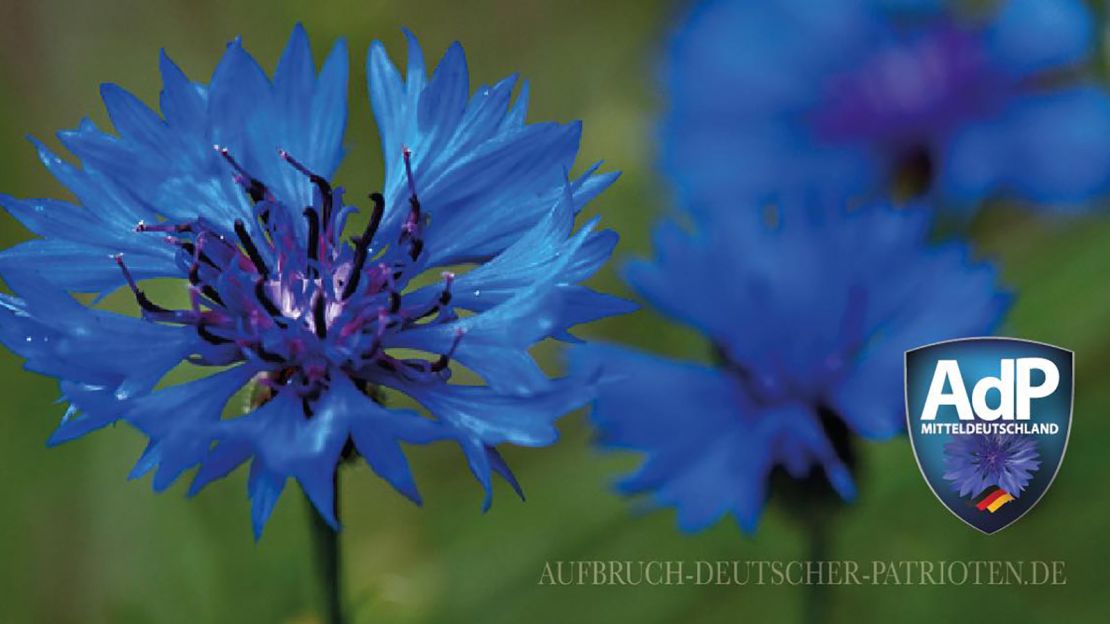A leading far-right German politician has announced his departure from the Alternative for Germany (AfD) party in order to create his own political organization.
The new party’s logo includes a cornflower, which was also adopted as a secret symbol by Nazis in the 1930s.
André Poggenburg, a former leading figure in the AfD in the eastern state of Saxony-Anhalt, resigned this week with an email sent to the leadership, in which he criticized the party’s supposed move to the left.
“Unfortunately, developments inside the AfD in the past weeks and months have shown, that this is no longer my true political home,” he said in the email, which was seen by German news site Spiegel Online.
His new party is called Aufbruch der deutschen Patrioten (Awakening of German Patriots), and Poggenburg has updated his social media profiles with party logos featuring a cornflower with a German flag. The flower was previously worn as a secret symbol identifying members of the then-illegal Nazi party in Austria in the 1930s. It was also the favorite flower of Kaiser Wilhelm – the last German emperor and king of Prussia – and came to be a symbol of pan-German nationalism in the 19th century.

The flower was associated with German nationalism even before the emergence of the Nazi party, after far-right politician Georg von Sch?nerer encouraged his supporters to wear it at the end of the 1800s. Sch?nerer was a major exponent of German nationalism and a fierce anti-Semite, and is regarded as having a key influence on Adolf Hitler.
It was more recently the chosen flower of the far-right Freedom Party (FP?) in Austria before it was dropped as that group’s symbol in 2017. And leading FP? politician Norbert Hofer – who is now Austria’s minister for transport, innovation and technology – was seen wearing the flower while campaigning for the presidency in 2016.
Poggenburg told the German newspaper Welt that he does not plan to veer far from AfD policy and intends instead to “stay with the successful positioning of the AfD of around two years ago and not go along with the noticeable shift to the left.”
He has drawn sharp criticism in the past for his controversial comments regarding immigrants in Germany. He resigned from his position as the party’s regional chairman of the eastern state of Saxony-Anhalt in 2018 after branding Germany’s Turkish population “camel traders” and an “unpatriotic rabble.”
“These camel drivers should go off to where they belong; far, far beyond the Bosporus to their mud huts and polygamy,” he told AfD members.
Poggenburg did not immediately respond to CNN requests for comment.
Georg Pazderski, the AfD’s deputy leader, told CNN that the party is not concerned by Poggenburg’s resignation. “This was a consistent step by Mr. Poggenburg. I do not think that Mr. Poggenburg’s resignation will hurt the AfD in east Germany, the AfD will be fine. The resignation shows that we are the only truly conservative party left in Germany and that people who do not agree with our conservative course can leave.”
AfD spokesman J?rg Hubert Meuthen also welcomed the news. Speaking to the German public radio station Deutschlandfunk, he said Poggenburg’s politics did not align with the wider party. “He has said that it is legitimate to be part of the radical right-wing… that is not a position that we have,” Meuthen said.
Poggenburg has nevertheless accused the AfD of breaking campaign promises. He told Welt that the AfD are “often no longer perceived as a true patriotic alternative and have in this respect severely lost credibility.” Poggenburg has also criticized what he sees as the hysteria at the heart of the party over the possibility of being put under police surveillance.
Poggenburg’s intention to depart the AfD and form his own party was confirmed Thursday when his political ally Egbert Ermer told Spiegel that the “project of forming a political party has today started.” He said this would be a “middle German movement,” with branches in Brandenburg, Saxony and Saxony-Anhalt.

